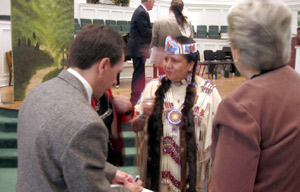 After giving her testimony, the North American Mission Board’s Alpha Goombie, a native American, chatted with these South Carolina Baptists attending the state WMU meeting.
After giving her testimony, the North American Mission Board’s Alpha Goombie, a native American, chatted with these South Carolina Baptists attending the state WMU meeting.“No matter who you are or how old, you are called to be involved in missions,” Evelyn Blount told the approximately 700 delegates attending the annual meeting of South Carolina Woman’s Missionary Union March 24-25 at Concord Baptist Church in Anderson.
Blount, executive director of South Carolina WMU, said in a closing address that “courageous women have been an exciting part of WMU, finding “interesting and creative ways to get the job of missions done.”
Pointing to WMU “pathfinders” of the past and present, she said that they “saw obstacles as opportunities,” finding ways to “get around them, over them and maybe even through them.”
These women, she said – calling an honor roll of women leading in missions involvement – have “found ways to take up their crosses daily and follow Christ.” Blount said that WMU must “be constantly looking for new paths and revamping old ways that keep us on the cutting edge of missions.”
“You, we,” she told the women, “are the WMU pathfinders for tomorrow.”
 Wanda Morris
Wanda MorrisDelegates re-elected Wanda Morris of Gaffney to a fourth and final one-year term as state Woman’s Missionary Union president. Morris, a member of New Pleasant Baptist Church, is a retired administrative secretary for the Broad River Baptist Association.
The meeting featured a message from Kay Miller, national president of Woman’s Missionary Union and a former missionary to Thailand. Emphasizing the theme of the meeting, “Pathways,” she said destination – “ending up where you wanted to go” – is the important thing. The “destination,” or the goal, is that “every person hears the gospel.”
“Lostness is lostness,” she made clear, “no matter where you live. Some paths are just outside our doors. The world is coming to our neighborhoods. These are people who need Christ.”
Saying that Little Rock, Ark., is her “Jerusalem” now, Miller told her audience, “The paths that lead beyond our Jerusalems are not always secure, and we may not want to be on a path with some people. And some paths lead to the ends of the earth.”
She challenged the women to be willing to go “anywhere that God calls,” to venture down “any path that God calls us to follow.”
Carlisle Driggers, executive director of the South Carolina Baptist Convention, praised WMU for its work in the overall work of the convention, for “all that we do in concert with one another.”
He spoke of a movement, especially among Southern Baptists, to “seek first the kingdom of God” and it is an emphasis that is “happening around the world.” He told of his recent trip to Russia, where he and other Southern Baptists taught Baptists there about Empowering Kingdom Growth, an initiative that began in South Carolina and later was adopted by the Southern Baptist Convention as a strategy for building the kingdom of God on earth and strengthening the churches of Christ everywhere.
Unfortunately, he pointed out, “We often are more interested in our own kingdoms,” and challenged the women, “Let’s be serious about being kingdom-focused people.”
Driggers said that Empowering Kingdom Growth with its emphasis on building the kingdom of God on earth is “a way of life” among Southern Baptists and will continue as a focus of denominational work “until Jesus comes.”
Marshall Fagg, director of the state Baptist convention’s evangelism and missions team, told the women that because of their “praying, giving and going,” people everywhere are “coming to a saving knowledge of the Lord.”
He said that South Carolina Baptists as a denomination are on a “Great Commission trail” and emphasized that “we must keep going where God has told us to go and not turn back.”
Fagg underscored the importance of the Acts 1:8 emphasis among Southern Baptists to be witnesses for Christ, saying, “It is an unchanging strategy for missions and for world evangelism.”
He said that the goal of at least one baptism in every South Carolina Baptist church during the year is “realistic,” but he quickly pointed out that more than numbers is at stake. “Baptism,” he said, “is not a statistic. It is a life-changing experience.”
A Native American now with the North American Mission Board, told of growing up in Oklahoma, where she was not permitted to join “white churches.” Alpha Goombi said that she grew bitter toward Christians and became convinced that “Jesus was a white man’s God.”
Later, realizing that she was “lost without Jesus,” Goombi, who attended the University of Oklahoma, told of the spiritual odyssey that brought her to the mission field – and the part South Carolina Baptists played in her conversion via the Annie Armstrong Easter Offering for North American Missions. “If you hadn’t given,” she said of the influence of Southern Baptists in her life, “I wouldn’t be standing here today.”
Terri Willis from the International Mission Board gave credit to South Carolina WMU for being “a strong partner at all levels” of missions work. She said that all people have “a yearning for peace” that is found only in Jesus, who, she declared, is “the one we are built to yearn for.”
She said that Jesus, who is “the way, the truth and the life,” is the “one path” leading to a right relationship with God.
South Carolina WMU has a total membership of 76,622, according to the organization’s summary report presented at the spring meeting. The 2007 meeting of South Carolina Woman’s Missionary Union is scheduled for March 16-17 at St. Andrews Baptist Church in Columbia.